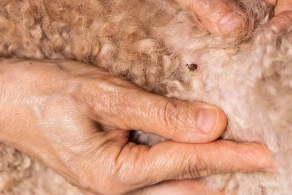
Mosquito Joe offers natural methods to repel ticks on dogs.
|
Ticks are a common concern for dog owners. Many pet parents seek effective tick repellent for dogs that won’t irritate their pet’s skin or disrupt their health. Ticks will latch onto your furry friend when they’re outdoors, taking advantage of a warm, moist area to feed in their fur. Ticks sometimes even breed on your pet. However, the biggest issue is that ticks also put dogs at risk of tick-borne illnesses, such as Lyme disease. So, pet owners go to great lengths to prevent tick bites on their dogs. Some opt for synthetic treatments, while others prefer natural tick prevention for dogs.
Learn more about tick prevention for dogs and how Mosquito Joe tick control can help.
Understanding the Risks of Ticks on Dogs
Ticks can cause a range of health problems for dogs, including Lyme disease, canine ehrlichiosis, and anaplasmosis. Depending on the tick species in your area, your dogs may face additional risks.
Lyme Disease
Lyme disease is one of the most common tick diseases in dogs. There are nearly one million positive cases of Lyme disease in dogs every year. Lyme disease is transmitted through bacteria from a tick bite, which your dog could get in grassy or wooded areas. If Lyme disease is untreated, it can lead to damage to the kidneys, nervous system, and heart and can even be fatal.
Canine Ehrlichiosis
Ehrlichiosis can be life-threatening for dogs. It may take one to three weeks for symptoms to emerge, and they can include lethargy, fever, joint pain, anemia, bleeding, eye problems, neurological issues, and swollen limbs.
Anaplasmosis
Ticks may also infect dogs with anaplasmosis, a bacterial disease. Symptoms may include vomiting, diarrhea, bleeding, loss of appetite, fever, and lethargy. Anaplasmosis can often be treated with antibiotics but can also lead to serious, life-threatening complications.
Other Tick-Borne Diseases
Depending on what tick species are found in your area, your dog could also be at risk of Rocky Mountain spotted fever, babesiosis, tularemia, and bartonellosis. All of these illnesses require prompt treatment and can lead to life-threatening conditions for your pup. Notify your veterinarian as soon as possible after removing a tick to monitor for adverse reactions. Keep in mind that ticks can also transfer from your dog to other pets or family members, putting everyone at risk of health problems.
Wondering what repels ticks on dogs naturally? There are several options that can be just as effective as synthetic treatments.
Natural Methods to Prevent Ticks on Dogs
For many dogs, the ideal method for how to prevent ticks on dogs may be the synthetic, topical formula recommended by veterinarians. It contains fipronil, a powerful chemical used to kill adult fleas and ticks on animal fur. But just like people, some dogs have very sensitive skin. So, those harsher chemical tick repellents can cause itching, irritation, and even skin lesions on pets. For this reason, many dog owners choose to use gentler, natural products. But which options work?
Lavender oil and apple cider vinegar are two of the most common natural remedies for tick prevention for dogs. However, effectiveness will vary, so it’s important to consult with your vet about what is best for your four-legged friend. Don’t forget to consult your veterinarian before using any of these products. They may suggest testing a product on a small portion of your dog’s skin before using it all over.

Store-Bought Natural Tick Repellent Formulas
There are many premixed natural tick repellents for dogs on the market, all with differing ingredients. Many of these contain essential oils. Be sure to read the instructions, as some products may require dilution before you apply them to your pet.
Essential Oils
Essential oil tick repellent for dogs is also a popular choice for pet owners looking to keep their dogs protected in the warmer months. The essential oil commonly used to repel ticks on dogs is lavender oil. It has a sweet, calming scent that is attractive to humans and dogs but loathed by bugs like fleas and ticks. Amazingly, lavender oil also prevents tick eggs from hatching.
Herbal Treatments
Some herbs can repel ticks, helping protect your dogs. They may be found in natural tick-repellent products or planted around your yard. These herbs include rosemary, lavender, garlic, mint, catnip, lemongrass, and marigold. Again, consult with your vet to ensure you’re not exposing your pup to anything toxic.
DIY Tick Repellents
DIY tick repellent for dogs may also be an option with the approval of your veterinarian. Here’s one recipe
- Slowly pour a quart of boiled water over a thinly sliced lemon in a glass jar.
- Let the mixture steep overnight.
- Strain the lemon water into a glass spray bottle, filling it about half-full. Add one cup of white vinegar or apple cider vinegar and 10 drops of lavender oil.
- Add one cup of white vinegar or apple cider vinegar and 10 drops of lavender oil.
- Shake it up and refrigerate it until use.
- Lightly spray the mixture on your dog’s fur, using your hand to work it in. Avoid spraying it around your pet’s eyes and mouth.
- Reapply every two hours when your dog is outside.
Creating a Bite-Free Environment for Your Dog
Stop ticks from getting close to your dog by creating a bite-free environment around your home. In addition to protecting your pets, a backyard shielded against ticks can also protect you and your loved ones as you enjoy the outdoors.
Removal of Litter
Do your best to keep your yard clear of rotten wood, leaf piles, and other debris. These areas can provide a dark, moist place for ticks to live and breed before latching on to their next host, which could be you or your dog.
Regular Landscaping
Prioritizing yard maintenance can also help keep ticks and other pests away. For example:
- Keep your grass cut short.
- Maintain a distinct boundary from wooded areas or areas with tall grasses.
- Put stacked wood in a dry area that won’t collect moisture.
- Keep trees, bushes, and plants trimmed.
- Be cautious of ground cover that could harbor ticks.
- Consider plants that naturally repel ticks, like citronella or lavender.
- Consider a mulch, wood chip, or gravel border that creates a hot, dry barrier around your yard.
You Handle the Treats. We’ll Handle the Ticks.
Professional Tick Control Treatments
One of the best ways to prevent ticks on your dogs—and on your other family members—is to keep ticks from coming to your yard in the first place. Mosquito Joe can help with that! Using our tick control on strategic areas of your yard, we’ll make sure no pesky ticks can bother your fur babies. We offer free inspections and quotes so you have a better understanding of your personalized treatment options. Plus, our Mosquito Joe services are backed by The Neighborly Done Right Promise® and our own Mosquito Joe Satisfaction Guarantee to ensure you’re satisfied.
Care for Your Dog

Tick prevention for dogs doesn’t stop there. Keep a close eye on your dog when they’re outside so you know what they’re getting into. Always check them for ticks, but be especially cautious if they go into wooded or grassy areas. Grooming regularly helps remove any ticks and gives you a chance to inspect your dog’s skin and coat.
How Mosquito Joe Can Help With Tick Prevention
It is important to find and remove ticks from your dog quickly. However, there are ways to prevent ticks from latching onto your dog in the first place. Consider various types of tick repellents for your pups and how you can keep your yard shielded from ticks so they—and you—can freely enjoy their time outdoors. And don’t forget, Mosquito Joe can help, too!
Your dog is a member of the family, and you want to protect your whole family from ticks. While you might try any of these natural methods for tick repellent, the most effective plan is to use a combination of all these things: a topical (vet-approved) treatment, a professional yard treatment, and tick habitat removal. You can trust Mosquito Joe for professional yard treatment and advice about habitat removal.
We’re experienced and equipped with a proprietary, eco-friendly formula that works for weeks.
To get started, give us a call or request a free estimate online.
This article is intended for general informational purposes only and may not be applicable to every situation. You are responsible for determining the proper course of action for your home and property. Mosquito Joe is not responsible for any damages that occur as a result of this blog content or your actions. For the most accurate guidance, contact your local Mosquito Joe location for a comprehensive, on-site assessment.
Frequently Asked Questions About Natural Tick Prevention for Dogs
How do I prevent ticks on my dogs without chemicals?
Essential oils like lavender or DIY sprays with vinegar and lemon are popular choices—but one of the most effective natural repellents might be in your own backyard. Mosquito Joe® offers natural treatment options that target ticks where they live, helping protect your pup’s favorite play space. It’s a powerful way to keep tails wagging and ticks away!
Is tick repellent safe for dogs with sensitive skin?
Some natural tick repellents—like diluted essential oils or vinegar-based sprays—are gentler than synthetic treatments, but every dog reacts differently. If your pup has sensitive skin, always check with your vet before trying a new product and consider testing it on a small area first. You can also reduce the need for topical treatments altogether by keeping your yard fortified against ticks. That’s where Mosquito Joe® comes in—our natural outdoor treatments target ticks at the source, so your dog can enjoy the outdoors with fewer bite risks.
How do you safely remove a tick from a dog?
First, stay calm—your pup’s counting on you! Using fine-tipped tweezers, gently grasp the tick as close to your dog’s skin as possible. Pull upward with slow, steady pressure—no twisting or yanking, or you risk leaving parts behind. After removing the tick, wash your hands thoroughly with soap and water, and clean the bite area. Place the tick in a sealed bag in case your vet wants to examine it later.
Finally, keep an eye on your dog to make sure they’re acting normal in the days that follow.
How often should I reapply natural tick repellent?
Natural sprays and topical treatments usually need to be reapplied every few hours while your dog is outdoors—especially after they get wet or have a good roll in the grass. Powders and collars work a bit longer and typically only need refreshing once a week. Keeping up with this schedule helps keep ticks from crashing your dog’s outdoor fun
